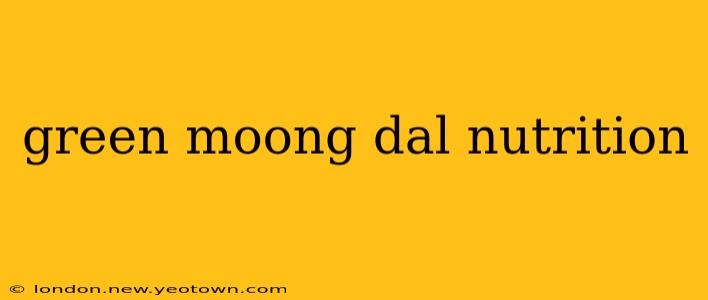Green moong dal, also known as split green mung beans, is more than just a humble legume; it's a nutritional powerhouse packed with essential vitamins, minerals, and protein. For centuries, this versatile ingredient has been a staple in many Asian cuisines, and its popularity is rapidly expanding globally due to its incredible health benefits and delicious flavor. Let's embark on a journey to discover the secrets hidden within this tiny green bean.
What are the key nutritional benefits of green moong dal?
Green moong dal boasts an impressive nutritional profile. It's an excellent source of plant-based protein, crucial for building and repairing tissues. Beyond protein, it's brimming with essential vitamins and minerals like folate, iron, magnesium, and potassium. These nutrients play vital roles in various bodily functions, from energy production to maintaining healthy blood pressure. Its high fiber content aids digestion and promotes gut health, contributing to overall well-being.
Is green moong dal good for weight loss?
Many find green moong dal a valuable addition to a weight-loss diet. Its high protein and fiber content contribute to satiety, keeping you feeling fuller for longer and reducing overall calorie intake. The slow-digesting carbohydrates provide sustained energy without the blood sugar spikes associated with refined carbohydrates. However, remember that weight loss is a multifaceted process involving a balanced diet and regular exercise; green moong dal is a supportive tool, not a magic bullet.
How many calories are in green moong dal?
The calorie content of green moong dal varies slightly depending on preparation methods, but generally, a cooked cup (around 200g) contains approximately 200-230 calories. This makes it a relatively low-calorie, high-nutrient food, ideal for those watching their weight. Keep in mind that adding ingredients like oil or ghee during cooking will increase the overall calorie count.
What are the health benefits of green moong dal for diabetics?
For individuals with diabetes, green moong dal presents several potential benefits. Its low glycemic index (GI) means it releases sugar into the bloodstream slowly, preventing rapid spikes in blood glucose levels. The high fiber content further aids in regulating blood sugar levels and improves insulin sensitivity. However, portion control is always essential, even with low-GI foods. Consult with your doctor or a registered dietitian for personalized dietary advice specific to your diabetic needs.
Can I eat green moong dal during pregnancy?
Green moong dal is generally considered safe and even beneficial during pregnancy. Its rich folate content is crucial for fetal neural tube development, while the iron supports the increased blood volume experienced during pregnancy. The protein supports the growth and development of the baby. However, as with any dietary changes during pregnancy, it’s crucial to consult your doctor or a registered dietitian to ensure it aligns with your individual health and dietary requirements.
How to incorporate green moong dal into your diet?
The versatility of green moong dal allows for effortless integration into various dishes. You can enjoy it as a simple dal (lentil soup), add it to salads for a protein boost, use it in vegetable curries, or even incorporate it into healthy snacks like sprouts. Its mild flavor complements many different cuisines and cooking styles, making it a wonderfully adaptable ingredient.
Conclusion: A Staple for a Healthy Lifestyle
Green moong dal is more than just a delicious and versatile legume; it’s a vital component of a healthy and balanced diet. Its impressive nutritional profile and diverse culinary applications make it a valuable addition to any meal plan, contributing to overall health and well-being. So, embrace this nutritional powerhouse and unlock the numerous benefits it offers. Remember to consult a healthcare professional for personalized dietary advice, especially if you have any underlying health conditions.

